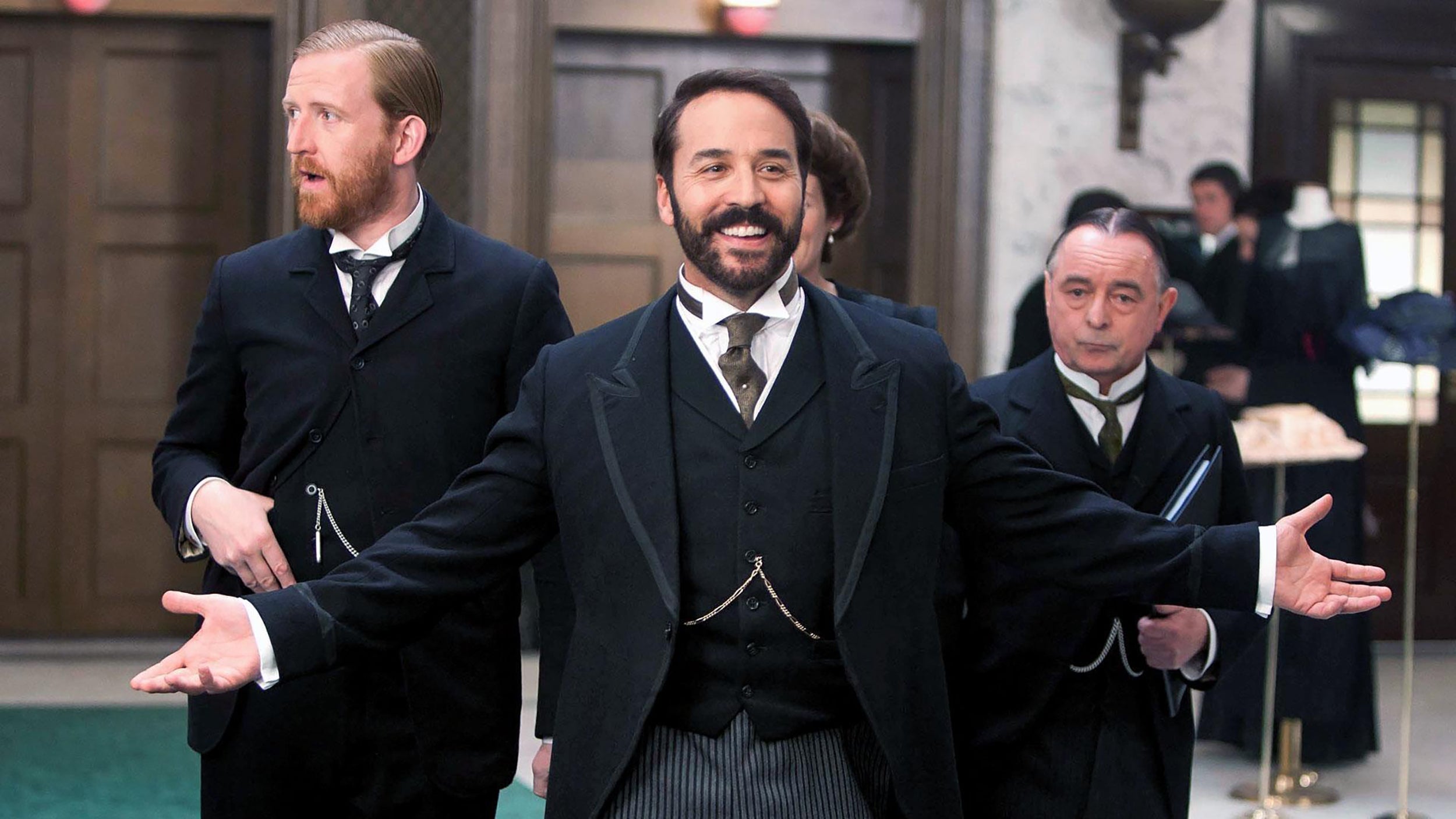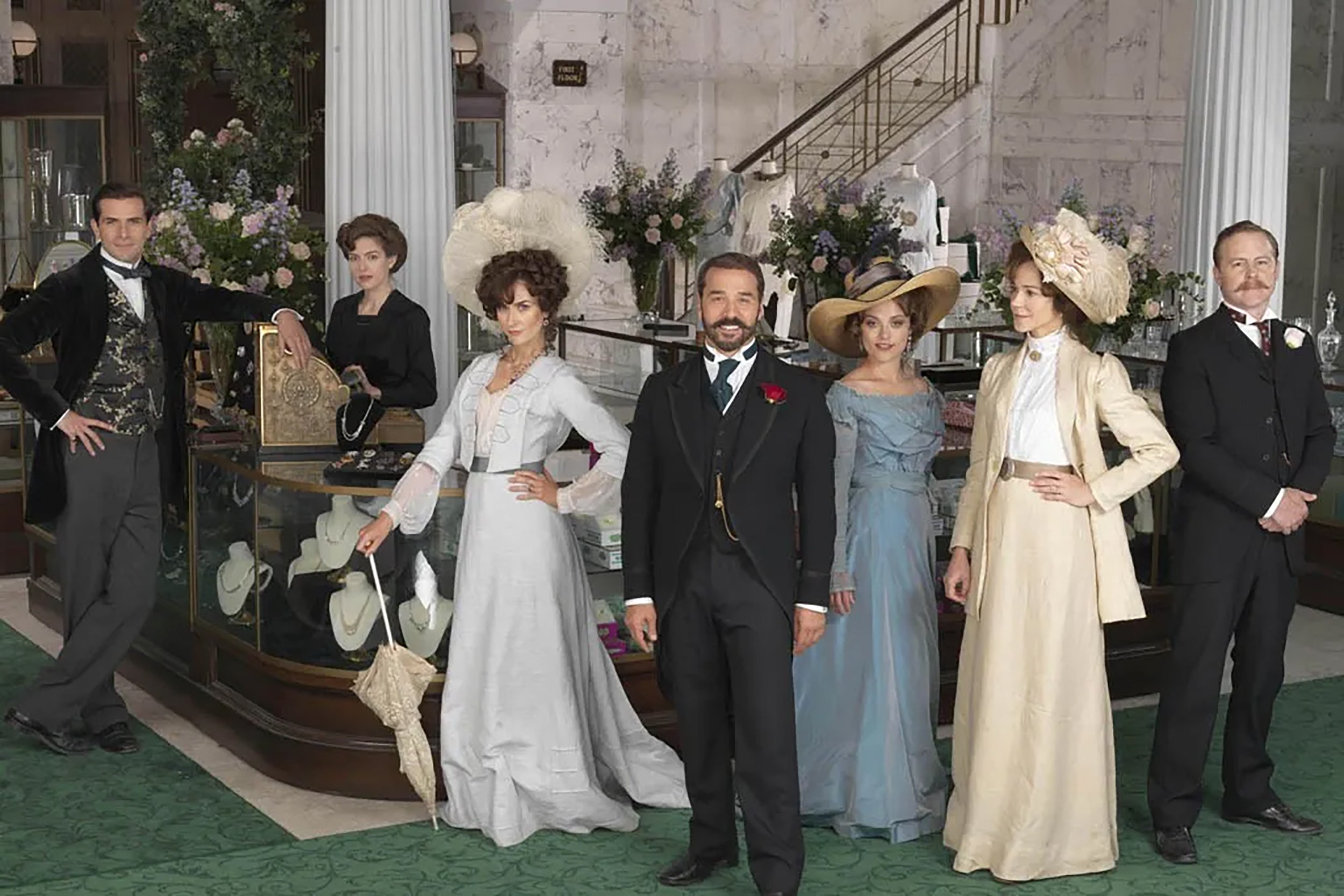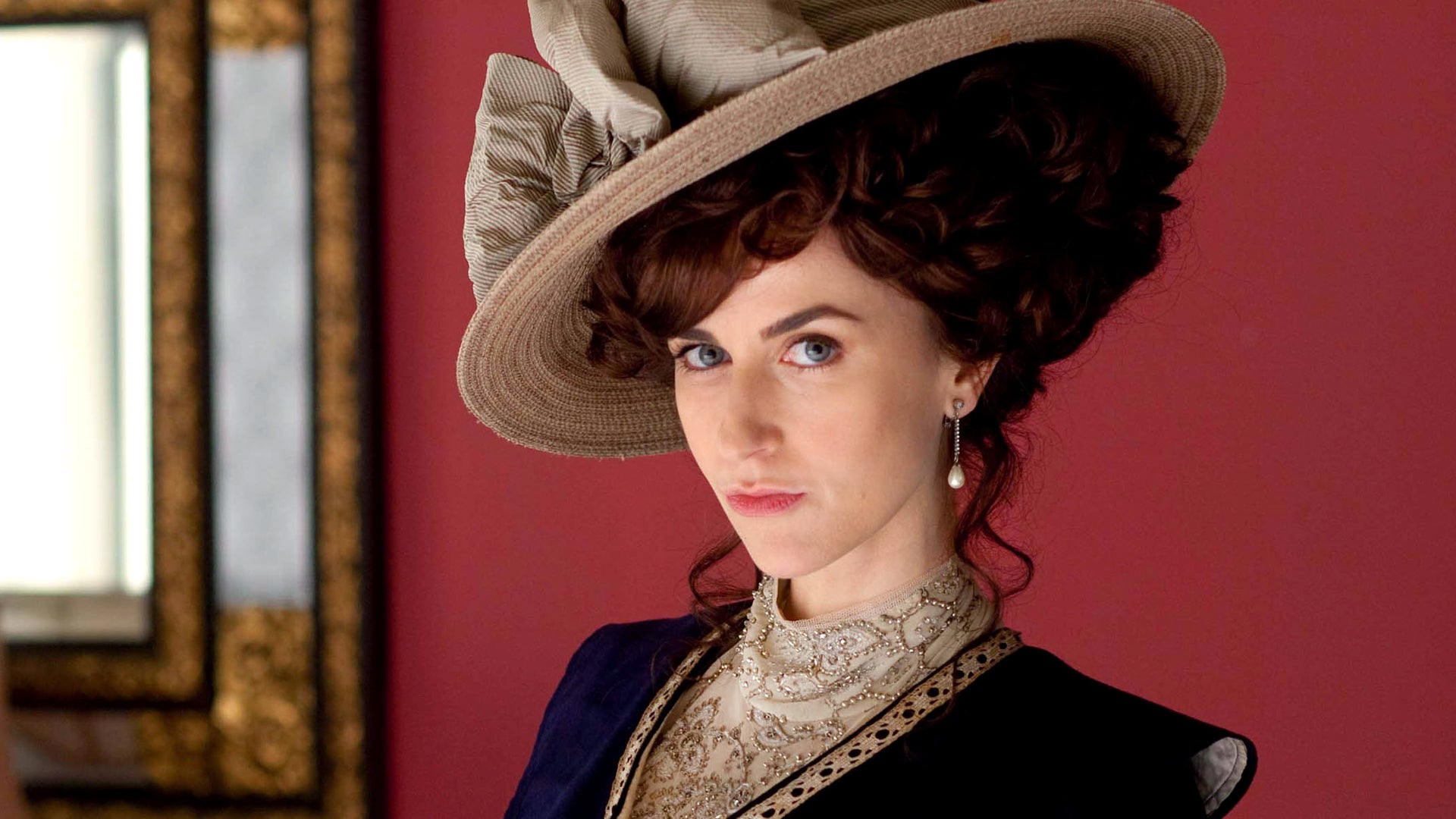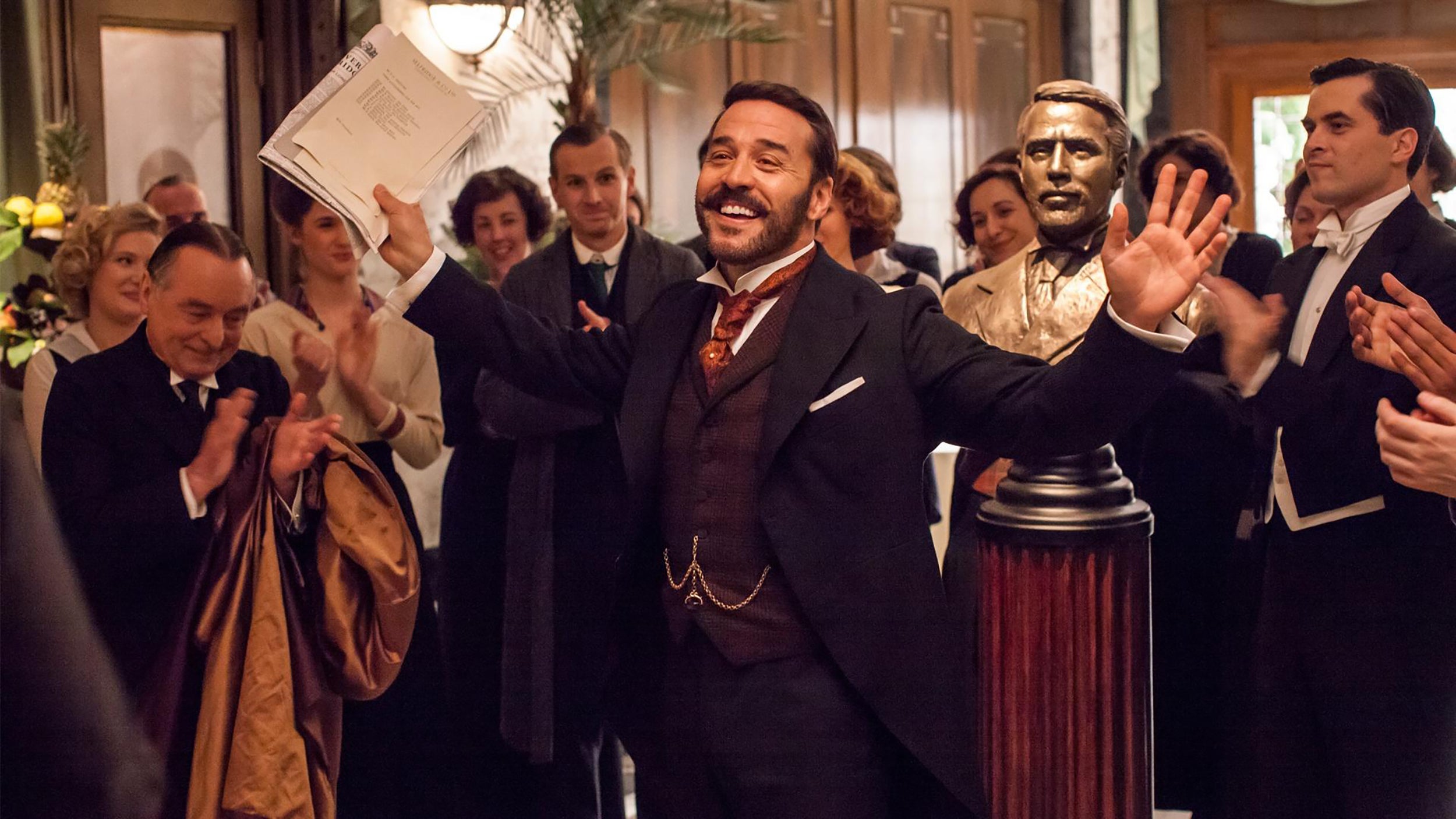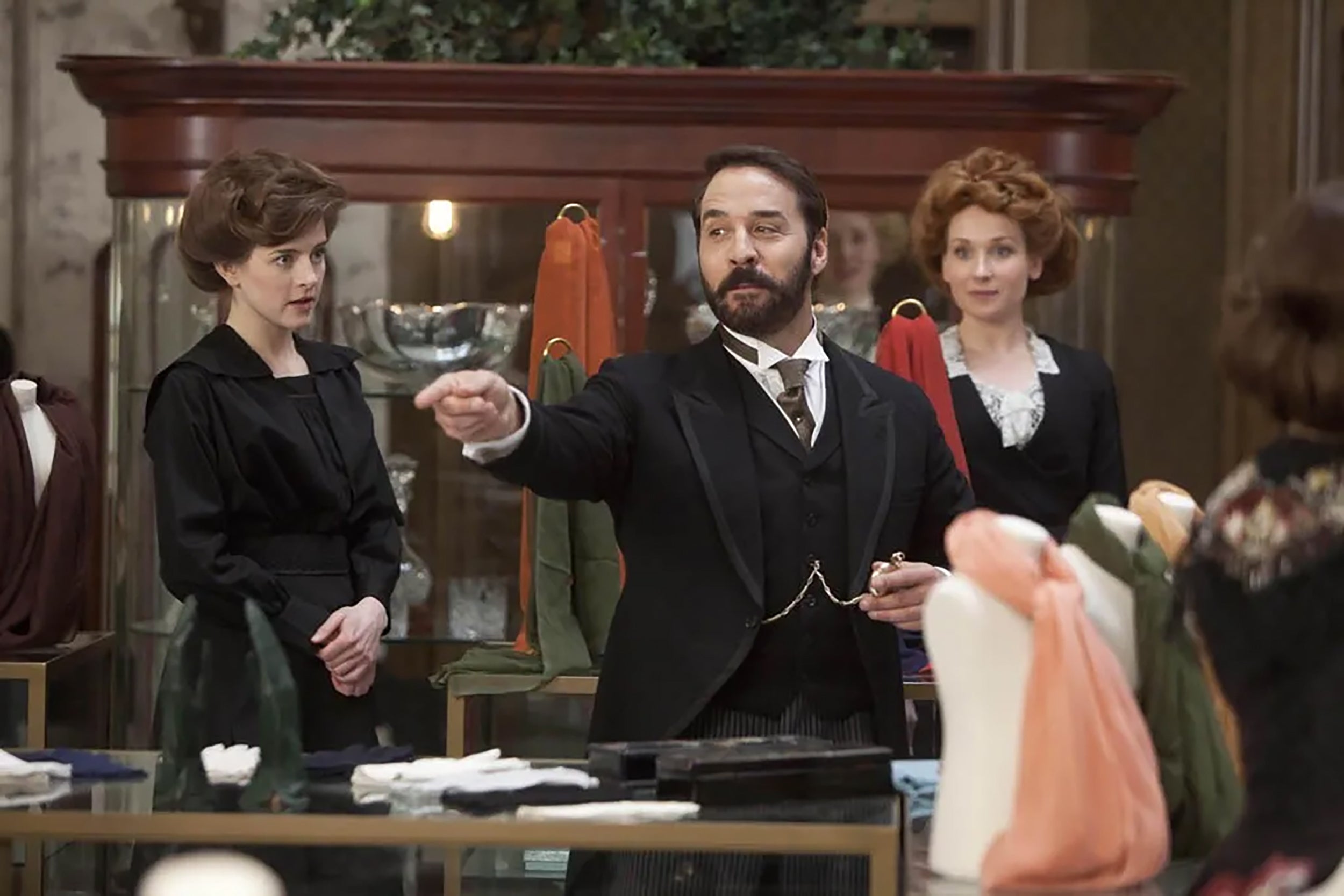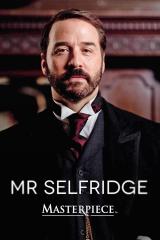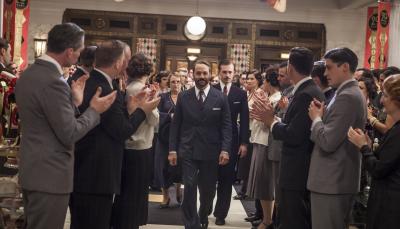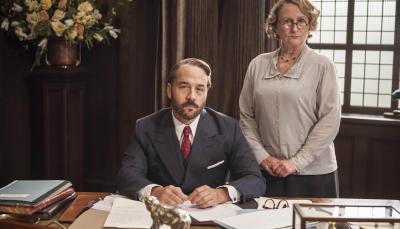'Mr. Selfridge's Premiere Has All the Makings of a Great Series
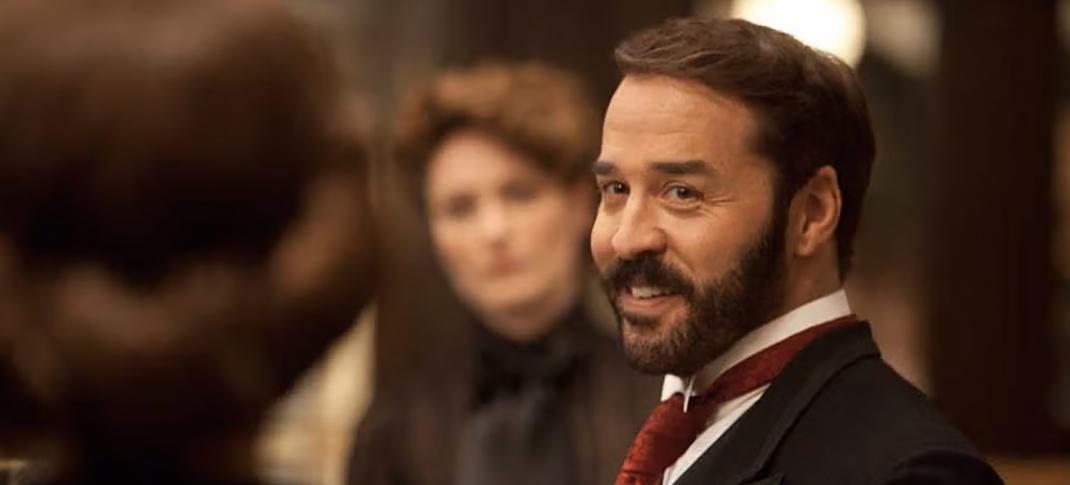
Jeremy Piven in 'Mr. Selfridge' Season 1
Masterpiece
New Masterpiece drama Mr. Selfridge is here – and it has all the makings of a great series. The story of the famous Oxford Street department store and the people who work there appears to be full of romance, intrigue, and questionable life choices.
"Oh, that Harry Selfridge. He’s so American."
Our story opens in a dimly lit shop where Ari Gold, a gentleman, is trying to buy some gloves but doesn’t like the ones he’s shown. The shop girl asks what he’d like to see instead, and he says maybe he won’t know what he wants until he sees it, so why not show him everything?
In case you didn’t know, this man is Harry Gordon Selfridge, and he is an American. A loud, pushy American, who doesn’t really care “how they do things” in England. So, of course, he immediately sets out to convince Gloves Girl that what she really wants to do is take out every piece of merchandise she has and make a huge mess with it, on the off chance that he might want to buy something from her. His main argument in favor of this method appears to be basically YOLO! and it’s surprisingly effective. She agrees and it’s all just fun and games until the shop manager rolls up and asks what’s going on. Selfridge assures him that everything is lovely.
(A personal note: In the interests of putting my biases out there early, I did not greatly enjoy Entourage. I did not greatly enjoy Ari Gold. I may still harbor some residual dislike, albeit vaguely, towards Jeremy Piven because of this, but I’m going to try to keep an open mind. I make zero promises about Ari Gold jokes, though. Those are definitely going to happen. So. Onward.)
The manager is curious about whether he intends to buy anything, but Selfridge gets all existential about it and asks what would happen if he were – gasp – just looking. The store manager reacts to this question like Carson finding footmen sitting in the parlor, insisting that this is a shop, not an exhibition, and maybe he should just be moving along. Selfridge shoots him a withering glance, says goodbye, and exits. Agnes, of course, gets fired, without a reference, because Department Store Mr. Carson now thinks she’s one of “those” people, whatever that means. Oh, well, Agnes. YOLO, right?
Luckily, just as Agnes is getting fired, someone’s left a fancy box for her. Inside are the pair of red kid gloves she’d identified as her favorite, along with Selfridge’s card.
Selfridge’s Big Plans
We cut to Selfridge getting dressed in a very posh location. He’s fixing his cufflinks, straightening his tie, and self-actualizing – all to get ready to meet a group of men outside a huge hole in the ground. Selfridge puts on his best showman grin and proceeds to basically hold a tent revival-style sales pitch, promising that the most fantastic store in the world is going to rise out of the rubble before them: Selfridge & Waring’s.
Being as this crowd is British, they are unimpressed by this hyperbole, but Selfridge simply drowns out their comments with the large brass band that he’s brought in for…. reasons. He then introduces his partner, Mr. Waring, who has arrived late to the festivities and is not at all into the band. Waring says he’d like to speak to Selfridge in private for a moment, and proceeds to initiate a Businessman’s Breakup. He says he’s pulling out of their venture, claiming that Selfridge is basically reckless and crazy. Selfridge is all fine, whatever, but he says that Waring’s not allowed to tell anybody about quitting until the store is up and running.
Selfridge puts a smile back on to say goodbye to the assembled crowd and then walks away with a mildly anxious look on his face. He encounters a newspaper reporter, and they instantly bond, with the reporter claiming that his store will be making news and that they should be friends. Mr. Edwards agrees to show Selfridge around town.
Setting Up for the Future
Selfridge’s wife, Rose, arrives in London the next day, along with her three children and her mother-in-law. Everyone is appropriately impressed by the grandeur of the house that Selfridge has had set up for them, and Selfridge is thrilled to see the missus.
Mr. Crab, Selfridge’s accountant and, it appears, personal assistant, is worried about the fact that the money from Waring hasn’t arrived yet. Selfridge blows him off, telling him not to worry and very specifically not mentioning that their business partner has broken up with them. He then heads off to talk to the new heads of department that he’s assembled – the store isn’t even built yet, but he has already hired people to run the major sections, and their jobs will include finding product and hiring staff over the next year.
Everyone choruses hello when Selfridge enters their meeting, and he gives them a pep talk (this will become A Thing) about how they are going to help Selfridge’s be born great from the start and make shopping thrilling. (Selfridge talks with his hands. A lot. I’m going to have to start a pool about when we think he’s going to sprain something.) Having set everyone to their tasks, he bursts out of the room and heads back to his office, where he looks anxious and tired again against his closed door. Meanwhile, back in the hallway, the staff is a bit nervous about getting paid while there’s no store, but Mr. Crab assures them that all is well.
Let's Go to the Theater
Selfridge goes to see a play that night with his new newspaper friend, Mr. Edwards. Mr. Edwards seems gross if his comments about women are anything to go by. Still, they are apparently watching a play where ladies in menswear-styled costumes sing a vaguely sexist song and dance in front of giant typewriter keys, so maybe it’s just society. Both men are fascinated by the lead actress, Ellen Love, and it’s clear Selfridge has an instant crush. The boys go back to visit Miss Love after her performance, and both flirt (poorly) in her general direction.
Ellen, however, is kind of interesting, if only because she seems to know exactly what she’s doing. She’s appropriately deferential toward Selfridge’s fame and leaves them both speechless when she offers to change out of her costume in the same room with them – albeit “decently” behind a screen. (The Dowager Countess would clearly not approve of this girl.) Once he’s done trying to scope out Ellen’s changing attire by sneaking peeks at her wardrobe mirror, Selfridge invites her to come by the office and see him sometime, because he’s got a business proposition for her.
Meet the British Papers
Selfridge is polling his kids about what kind of things they want to see in the store when the morning papers arrive. The early notices about him and the idea of his store upset Selfridge, and he complained that the UK papers wanted him to fail. This reaction is because, obviously, he’s never read or met the British press before. Really, this is mild. More bad news awaits him at the office when Mr. Crab points out the bit he missed in the paper reporting that Mr. Waring has pulled out of their partnership.
Selfridge is upset that Waring broke his promise about keeping the news out of the media, and Mr. Crab is upset that Selfridge didn’t bother to let him, the head of finance, know about this minor issue of them having no money. Mr. Crab says he’s somewhat dismayed by Selfridge's reckless business practices and points out that he left a very good job to work for him. He says he’s scared, but Selfridge reassures him. Poor Mr. Crab. That must be the most thankless job.
Introducing Lady Mae
Mr. Edwards takes Selfridge to meet Lady Mae Loxley, who used to be a good-time girl but has since married into a title and money. Edwards says she knows everyone. Lady Mae sits down to chat with Selfridge and says she hears he’s been causing quite a stir, because London doesn’t seem to like him much. She says London doesn’t like being told how to do things, but she immensely enjoys it. Lady Mae’s whole existence is basically like one big double entendre. Lady Mae immediately twiggs that Selfridge is there because he needs a new business partner. He gets offended by her presumption, but Lady Mae basically tells him she knows he needs the help whether he likes it or not.
A subdued Selfridge arrives home to the welcoming arms of Fraser, the butler, who is like the Santa Claus version of Mr. Carson. Selfridge, looking tired and drawn, stops by his son’s bedroom. Gordon asks his father what “huckster” means because one of the kids at school said it, and he got in a fight over it. Selfridge says that the kid probably meant it as an insult, but there’s nothing wrong with being a huckster, and Gordon should tell those kids he’ll be one, giving them jobs someday.
Later that night, his mother finds him sitting on the stairs. They have a heart-to-heart, wherein Selfridge admits to his mom that maybe they shouldn’t have come to London and that he’s in over his head. His mom boosts his confidence with the response, essentially, "What’s the worst that can happen?" This family is really ahead of their time with their internet meme-like life lessons. Selfridge admits that there’s someone who could help him, but he’s worried about getting involved with her. Mom says Harry can outsmart whoever gives him trouble. Harry’s mom is the best cheerleader. She says his father would be proud of what he’s accomplished, and Harry is totally not having any of that. (Clearly, this will be a plot point later.)
Let’s Just Build the Store
Thanks to Mae’s influence, Selfridge finds a new business partner and everything seems back on track. We whirl through an extended montage of various people looking at building plans or decorating the office for multiple holidays. Suddenly, there’s a posh building where that hole at the end of Oxford Street used to be, and things are about to get real. Apparently, it's real enough to hire staff, as that is what is happening. Selfridge’s has several hundred openings and a ridiculously lengthy and stringent list of what’s allowable in an employee (i.e., no engaged girls, thank you!)
The line is around the block to apply. Mr. Grove informs all the heads of department what they should be looking for in an ideal candidate and turns them loose, reminding them to pick the very best. He wants to find people who are passionate about their jobs. (Um, okay.)
All About Agnes
We learn that Agnes – the glove seller from our opening scene – is still unemployed and looking for work. She’s been scrubbing floors and scouring the papers and getting into fights with her occasionally physically violent unidentified male housemate and generally just not having a lot of success at life. So she turns up at Mr. Selfridge’s house to ask for a position at his store. She’s bravely wearing the red leather gloves he sent her, and it’s endearing. Of course, Fraser is scandalized by her presence.
Agnes tells Selfridge that he’s the reason she got fired from her previous position and that she’d really like a job at his store. Selfridge says he’s sorry and that since he was basically the reason her life fell apart, he ought to give her a chance to change it. He tells her to come to the store and see his Chief of Staff at 9 am.
Agnes shows up, meets a friendly boy in line for five seconds, and is interviewed by a very aggressive lady. Agnes explains that she doesn’t have any references, but she does have the explicit direction of Mr. Selfridge himself to be there. Miss Mardle (Aggressive Lady) basically snorts at this and fetches Mr. Grove in a manner that says she completely does not believe Agnes at all. She’s less than delighted to hear that Agnes does, in fact, have a job waiting for her and even less pleased when she has to admit that she’ll be working in the accessories department and reporting to her.
(Well, that sounds like work will not be a very pleasant experience for Agnes, but she’s adorably psyched to have a job.)
Mean Girls of the Accessories Counter
Staff issues sorted, everyone’s finally let into the new store to look around. Everyone’s wide-eyed and impressed, because really, it’s quite lavish and beautiful. This is unheard of for a shopping experience in this time period, as our dark and depressing shop from earlier illustrated. Agnes starts in accessories with three other girls and gets a speech from Miss Mardle about how vital their area of the store is in the grand scheme of life. Miss Mardle also remarks that she can’t understand why they’d ever appoint someone so young to be a senior assistant, and that she’ll be watching Agnes very closely.
It’s all said in such a way that it’s obvious she expects her to fail utterly. The other two girls in the background giggle while watching all of this, and I’ve already started calling them Regina and Gretchen in my head. They both make fun of Agnes behind her back, because of course they do. Naturally, however, Agnes manages to distinguish herself anyway by coming up with a brilliant idea for an accent piece for one of the shop windows when very suave, very French designer Henri Leclair gets stumped, and showing up Miss Mardle and the Mean Girls in the process.
Agnes Makes a New Friend & Finds an Old One
One day, when the store is looking just about ready to open, Ellen Love shows up to see Mr. Selfridge (complete with an awesome slow-mo entrance and a fabulous red coat). Pretty much the whole staff freaks out, but especially the Mean Girls, and it’s hilarious. Ellen is to have her long-awaited meeting with Selfridge, and – after a few minutes of flirting – he tells her he wants her to be the “Spirit of Selfridge’s” on all their posters because she embodies the spirit of the age. I’m not quite sure what that means at all, but Ellen agrees to do it, though she laments that the situation is not exactly the proposition she thought that Selfridge would have in mind.
Some time later, awesome Fraser tells Rose that Selfridge called to say that he won’t be home for dinner that night, and Rose complains to her mother-in-law that this is the third night that week that her husband’s been absent. They assume he’s busy with work, but of course, he’s out watching Terrible Typewriter: The Musical again and gazing longingly at Ellen during her performance. Yawwwwwn.
Leaving work that night, Agnes runs into the friendly guy she first met in line for Selfridge’s interviews. Turns out his name is Victor and he got hired too, as a waiter in the super posh Palm Court Restaurant. Agnes is impressed, and Victor invites her to come check it out, cunningly deploying the YOLO! argument to which Agnes is apparently very susceptible. Victor decides to practice his waiter skills on her, pretending she’s a customer, and serves her some sherry while flirting with her a lot.
He encourages her to be ambitious and tells her that he thinks she’s special, and then loud music swells in the background, so you know these two are going to be one of our big relationships on the show, at least for a bit. Agnes says she has to go, and Victor tries to get her to stay, and in the process of him trying to walk her to the tube, runs into Agnes’ aggressive gentleman friend from before, who immediately starts trying to get violent. Um, okay. Turns out this is her brother George, who may or may not have anger management issues. George is upset because “he” has tracked them down, whoever that is.
Grand Opening Drama
After a weird sprinkler leak, which ruins the window displays the night before they’re supposed to open and requires a Patented Selfridge Pep Talk to overcome, everything in the story is ready to open. Somehow, in the midst of speechmaking and preparation, Selfridge finds the time to send Ellen an exceptionally posh fur coat at the theater, which she immediately latches onto and joyfully dubs her “ticket out of here”. Ellen is annoying, but also very fun to watch, because she’s very ambitious and willing to do absolutely anything to get what she wants. Her personality is as fake as Selfridge’s persona in many ways, and it will be interesting to see how the two interact. In other Opening Day Drama, Agnes somehow stumbles upon Mr. Grove and Miss Mardle holding hands, which is certainly problematic given that Mr. Grove is married. Awkward.
But, finally, after handwringing and speechmaking and flooding and doubt, Opening Day arrives. There’s a huge crowd and everyone who’s anyone seems to show up to inspect the wares at Selfridges’, though Lady Mae and her dramatic entourage get the best entrance. Ellen Love is also there, who introduces herself to Rose as the Spirit of Selfridge’s, claiming smugly that she’s sure “Harry’s” told her all about her. Rose obviously hates Ellen instantly, and it’s fantastic. But on the whole, everyone is super proud and pleased by the first day. Except Mr. Crab, of course, because it’s his job to be anxious about things.
The Day to Day
With the official opening day spectacle behind them, there are tremendously fewer customers (read: like zero) coming into the store. Selfridge gives a Patented Pep Talk about how customers should be crawling all over them and how they have to put on a show to attract them. He immediately starts scheming stunts to get more people in the store, including having special sales, bringing a famous cricket player in, and so on. Mr. Crab is worried about money, Ellen is complaining about her new “Spirit of Selfridge’s” photos, and Henri hates Ellen and her complaining. It’s a pretty busy morning, but it certainly doesn’t have the feel of success about it.
Agnes asks Mr. Grove if she can chat with him about a private matter when he gets a second. Grove says Sure, but exchanges a look with Miss Mardle, and you can tell they think Agnes is going to rat out their affair. Agnes wants to ask if Grove believes a position might be available for her brother. Grove immediately thinks she’s going to try to blackmail him if he says no, so he gives Agnes a lecture about how important discretion is at Selfridge’s. She agrees that some things should be private, and George gets a job on a trial basis. Agnes is super pleased and runs into Victor on the stairs, where they flirt some more. Aww, kids, go get a drink or something, okay?
Rose comes downstairs to be greeted by Awesome Fraser, who is totally sad to have to tell her that Mae has come by and he let her in because she was basically crazy pushy. Rose pretends to be happy to see her, and Mae pretends that she might actually leave and let Rose get on with her day, but they’re both lying. Mae says she dropped by to see how they’re settling in and fake commiserates that they must be so neglected with Selfridge so busy at the store. She also asks if they’ve met Ellen, who Mae says has a “thing” for being charming to men.
Rose says she was heading out to check out the National Gallery, and Mae lectures her about how no one goes there on public days because you could just run into any old sort of riff-raff. Rose says she thinks the paintings are probably the same, no matter who is looking at them. I have literally no idea why these two seem to despise each other – I didn’t get a vibe they were fighting over Selfridge or anything – but it’s kind of entertaining anyway. Mae offers to give Rose a ride to the museum, but Rose decides to have fun by taking a ride on the underground instead, to the shock of everyone.
Selfridge’s Next Big Thing
Selfridge and Ellen are having lunch and, in the middle of their somewhat predictable, boring flirting, she manages to give him the idea for his next big thing, thanks to claiming that he’s so awesome and decisive and reckless that he’s just like that Frenchman trying to fly the English Channel. (She’s talking about Louis Bleriot.) Selfridge immediately decides that he needs to meet him and get him and his plane into the store, because that’s what will get people in to buy merchandise. (This logic, I’m not entirely following it, but okay.)
Agnes and George’s father is the “He” that George was referring to earlier; Reg Towler shows up at Selfridge’s looking for Agnes, and she is instantly begging him not to ruin her new job for her. Her dad insists that he’s a changed man who wants to make up for everything he did to her and her brother (which was apparently beating them whenever he was drunk). He swears he’s given up drinking, has a new job, and is trying to get back on his feet so he can do right by them this time around. Agnes, because she is either very sweet or foolish, says that Reg can stay with them until the end of the month, when he can get his own place.
(Of course, this vow lasts till the end of the episode when he sort of assaults George and plays it off as a joke, so this should be a fun plotline.)
Spirit of Selfridge’s
Rose successfully navigates the tube and goes to take in some art. She meets a hipsterish (or whatever the Edwardian word is for hipsterish) young man who basically looks like a college student, who is also admiring the art. And they talk about art and feminism and everything, and this is clearly supposed to be Rose exploring something about herself – whether it’s that she feels powerless or whether she’s assumed that Harry’s being unfaithful, so why shouldn’t she? I’m not sure. She lies about her name and why she’s in England, clearly enjoying the anonymity for this brief moment. Rose eventually rejects the romantic advances of Edwardian College Hipster. Still, the interesting bit is that she went along with any of it at all, which suggests that in many ways she’s unhappy and upset with her husband. So that should be interesting to watch.
Selfridge and some other guys actually drive all the way out to Dover, where Bleriot is landing. Bleriot isn’t really interested in Selfridge trying to ride the coattails of his fame. Still, his mind is quickly swayed by a magical Selfridge Pep Talk about the future, modernity, and how they understand it together. (Snore.) Suddenly, the two are best friends posing for pictures with the press, and they’re shipping the famous plane off to Selfridge’s front lobby. Selfridge devises a comprehensive advertising plan to draw people in and forces Henri, the renowned designer, to create an entire exhibition around it. (Henri is displeased by this and threatens to quit, but doesn’t.)
Selfridge asks Ellen to do a personal appearance as the “Spirit of Selfridge’s” with the plan. Ellen promises she’d do anything for him, and the two end up making out, but they get caught by one of her castmates, which makes Selfridge rethink the situation. They have a very strange chemistry; I actually think Ellen’s scheming is interesting, but I have a hard time believing anyone is rooting for this relationship either. (I suppose we’re not really supposed to.)
The next day, Ellen’s posing on top of the plane as the Selfridge family arrives to take in the entire spectacle. There are loads of people in the store, and Selfridge apologizes to his wife bout ignoring her all week before wandering off immediately. Suddenly, Mae appears out of nowhere to remind Rose that Selfridge is obsessed with Ellen. Why? I have no idea. Rose suddenly decides she wants to leave, which reminds Selfridge she exists, as he tells her he has to share his great triumph with her. He makes puppy eyes at her and begs her to stay and she reluctantly, which would probably be more sweet or meaningful if we didn’t find out three scenes later that Selfridge had also got Ellen a brand new place to live so that they can be together. Poor form, Harry. Poor form.
Excess Plot
There’s also a subplot about Victor getting hired because he was attractive, making him essentially eye candy for the ladies in their posh restaurant. It involves Victor being hit on repeatedly by a society type lady and then being invited to help her host a dinner party at her house, which apparently does not mean anything having to do with dinner. Awkward. Victor ultimately decides he can’t go..um.. work for this lady because reasons – whether they’re to do with Agnes or just because the whole set-up is creepy is unclear, but you do breathe a sigh of relief at the end anyway. (The only part of this that’s of any fundamental importance is that Victor finally asks Agnes to have tea with him. She has to say no because of the dad problem, but she thinks she might say yes next time. He gives her a box of chocolates as a gesture of goodwill. It’s really sweet.)
I’m not entirely sold on Piven’s performance as Selfridge, though I think it has enjoyable moments. He relies heavily on a “play to the back of the theater” style of acting, which can be exhausting, as everything about his Harry is larger than life all the time. There are these smaller moments – which, quite frankly, I think we need to see more of – where you can see how much of an act it is, and how much it costs Harry to be Mr. Selfridge all the time and always be living life turned up to eleven.
Those are the interesting bits for me – not Selfridge going on about making the store great or how amazing the spectacle is or something that sounds like advertising. Selfridge is obnoxious and loud, so over the top that you find yourself hoping we’ll get back to one of the other characters eventually. The pull between the public persona and the real Selfridge is basically what’s going to make this character enjoyable – well, that and hopefully that Piven might learn to dial it down a touch in later episodes.
So here’s hoping we actually explore that dichotomy within this character – like the scenes with his son or his mother when he lets his guard down a bit and stops being PT Barnum all the time – instead of just being varying degrees of loud. Fingers crossed.
All seasons of Mr. Selfridge are streaming on PBS Passport for members.

